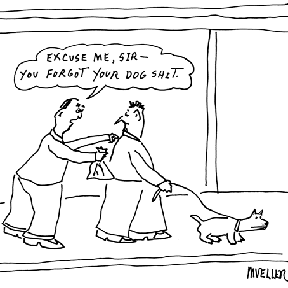REBECCA'S DOGSITTING: PROSPECTWALKS@GMAIL.COM
Friday, May 28, 2010
Dogs Define Home
Are our dogs really "ours"? One of the possessions our houses contain? Or do they actually define the space we call home?
"Mine", directed by Geralyn Pezanoski, aired on PBS the other day. Pezanoski told Independent Lens about her time in New Orleans filming the animal rescue efforts after Hurricane Katrina, where custody battles were arising over other 'Katrina pets'....
One Katrina survivor described his dog as "the only thing I have left." His dog was not a "thing" to him, of course, but he had nothing left of his life and home before the storm, and the restoration of his dog would in turn restore some kind of continuity....
Then there was the Katrina dog adopter who would not return her dog to his former owner. "He's mine!" she could not stop repeating, insisting that had she not rescued him from the shelter, the dog would be dead now. She wasn't a bad sort. Maybe what she really meant was not just that the dog was more hers than the previous owner's, but that the dog had a new home and should not be displaced again.
It's hard to know exactly what "home" is, for a dog. But it's clear once we bring dogs into our home, they start to redefine it. First they sniff out the perimeter, mark their path. Pretty soon they are barking at those outside it...
A dog's home may shift, but always has an element of "this is the space which is mine" to it, it is always territorial and defined. Which brings to mind a whimsical article by Abdelfattah Kito, in a book about people displaced from their homes....
"Quick, what does a bedouin do when he loses his way at night in the desert?", writes Kito in "Dog Words". "What strategem does he use to find human habitation, and therefore find himself?"
"...So a man is lost at night in the desert and must find his clan at any price. During the day he may well have laid a trail of stones along the way, and his feet probably made prints in the sand. At night however, neither the stones nor the prints are easily perceived...."
"What does he do?...he starts barking (incredible but true)... As he walks about then, our nocturnal itinerant emits a few scattered barks. If there are any dogs in the area they will start to bark in turn and indicate human habitation...."
"One must bark to find one's way," Kito continues, "in order to become human one must first turn into a dog...."
"Mine", directed by Geralyn Pezanoski, aired on PBS the other day. Pezanoski told Independent Lens about her time in New Orleans filming the animal rescue efforts after Hurricane Katrina, where custody battles were arising over other 'Katrina pets'....
One Katrina survivor described his dog as "the only thing I have left." His dog was not a "thing" to him, of course, but he had nothing left of his life and home before the storm, and the restoration of his dog would in turn restore some kind of continuity....
Then there was the Katrina dog adopter who would not return her dog to his former owner. "He's mine!" she could not stop repeating, insisting that had she not rescued him from the shelter, the dog would be dead now. She wasn't a bad sort. Maybe what she really meant was not just that the dog was more hers than the previous owner's, but that the dog had a new home and should not be displaced again.
It's hard to know exactly what "home" is, for a dog. But it's clear once we bring dogs into our home, they start to redefine it. First they sniff out the perimeter, mark their path. Pretty soon they are barking at those outside it...
A dog's home may shift, but always has an element of "this is the space which is mine" to it, it is always territorial and defined. Which brings to mind a whimsical article by Abdelfattah Kito, in a book about people displaced from their homes....
"Quick, what does a bedouin do when he loses his way at night in the desert?", writes Kito in "Dog Words". "What strategem does he use to find human habitation, and therefore find himself?"
"...So a man is lost at night in the desert and must find his clan at any price. During the day he may well have laid a trail of stones along the way, and his feet probably made prints in the sand. At night however, neither the stones nor the prints are easily perceived...."
"What does he do?...he starts barking (incredible but true)... As he walks about then, our nocturnal itinerant emits a few scattered barks. If there are any dogs in the area they will start to bark in turn and indicate human habitation...."
"One must bark to find one's way," Kito continues, "in order to become human one must first turn into a dog...."
Subscribe to:
Post Comments (Atom)




nice article, thanx for information.
ReplyDeletedog Waste bags
Great post you share with us and I love to read your post and truly describe "Dogs Define Home". I hope you share an awesome post article in future.
ReplyDeletedog treats recipes